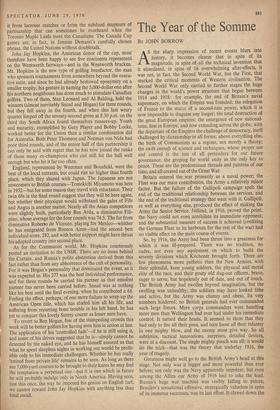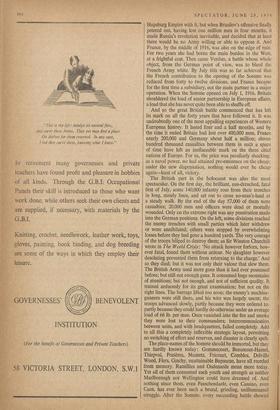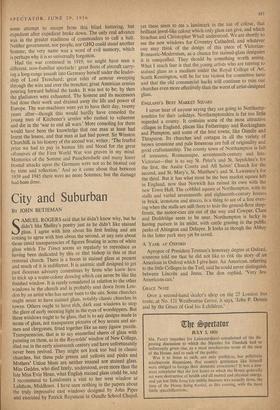The Year of the Somme
BY JOHN BORROW S S the sharp impression of recent events blurs into history, it becomes clearer that in spite of its magnitude, in spite of all the technical invention that it stimulated. in spite of its overwhelming after-effects, it was not, in fact, the Second World War, but the First, that marked the critical moments of Western civilisation. The Second World War only carried to further stages the huge changes in the world's power structure that began between 1914 and 1918: for example, the end of Britain's naval supremacy, on which the Empire was founded; the relegation of France to the status of a second-rate power, which it is now impossible to disguise any longer; the total destruction of the great European empires; the emergence of new national- isms, first in Europe, and now extending across the globe; with the departure of-the Empires the challenge of democracy, itself challenged by dictatorship in all forms; above everything else, the birth of Communism as a regime, not merely a theory; the swift onrush of, science and techniques, whose proper use and control is the test of all pretenders for our future governance; the groping for world unity as the only key to peace. These are the predominant threads and patterns of our time, and all created out of the Great War.
Britain entered the war primarily as a naval power; the Fleet was our main contribution, the Army a relatively minor factor. But the failure of the Gallipoli campaign spelt the end of the traditional relationship between the services, and the end of the traditional strategy that went with it. Gallipoli, as well as everything else, produced the effect of making the Army the Senior Service. Jutland, in 1916, proved the point; the Navy could not even annihilate its immediate opponent; and the substantial measure of success it achieved (confining the German Fleet to its harbours for the rest of the war) had no visible effect 'on the main course of events.
So, by 1916, the Army had been thrust into a greatness for which it was ill-prepared. There was no tradition, no cadre, not even any equipment on which to build the seventy divisions which Kitchener brought forth. There are few phenomena more pathetic than the New Armies, with their splendid, keen young soldiers, the physical and moral elite of the race, and their gouty old dug-out officers, brave, eager to serve, but hopelessly out of date, and out of touch. The British Army had swollen beyond imagination, but the swelling was unhealthy; the soldiers may have looked lithe and active, but the Army was clumsy and obese. Its very numbers hindered; no British generals had ever commanded such large forces. Mere corps commanders were handling more men than Wellington had ever had under his immediate control. It turned their heads. It seemed to them that they had only to fire all their guns, and turn loose all their infantry in one mighty blow, and the enemy must give way. So all subtleties, tactical innovations, surprises, detailed devices, were at a discount. The single mighty punch was all; it would do the trick—that was the theory that underlay 1916, the year of tragedy.
Greatness might well go to the British Army's head at this stage. Not only was it bigger and more powerful than ever before; not only was the Navy apparently impotent, but even among the Allies our Army of 1916 had to take the lead. Russia's huge war machine was visibly falling to pieces; Brusilov's sensational offensive, strategically valueless in spite of its immense successes, was its last effort. It clawed down the Hapsburg Empire with it, but when Brusilov's offensive finally petered out, having lost one million men in four months, it made Russia's revolution inevitable, and decided that at least there would be. no Army willing or able to oppose it. And France, by the middle of 1916, was also on the edge of ruin. For two years she had borne the main burden in the West, at a frightful cost. Then came Verdun, a battle whose whole object, from the German point of view, was to bleed the French Army white. By. July this was so far achieved that the French contribution to the opening of the Somme was reduced from forty to twelve divisions, and FranCe becqme for the first time a subsidiary, not the main partner in a major operation. When the Somme opened on July 1, 1916, Britain shouldered the load of senior partnership in European affairs, a load that she has never quite been able to shuffle off.
And so the great British battle commenced that has left its mark on all the forty years that have followed it. It was undoubtedly one of the most appalling experiences of Western European history. It lasted four and ,a half months, and by the time it ended Britain had lost over 400,000 men, France nearly 200,000 and Germany about half a million; eleven hundred thousand casualties between them in such a space of time have left an ineffaceable mark on the three chief nations of Europe. For us, the price was peculiarly shocking: as a naval power. we had attained pre-eminence on the cheap: under the new dispensation, nothing would ever be cheap again—least of all, victory.
The British part in the holocaust was also the most spectacular. On the first day, the brilliant, sun-drenched, fatal first of July, some 140,000 infantry rose from their trenches in long, stately lines, and set out to cross no-man's-land at a steady walk. By the end of the day 57,000 of them were casualties; 20,000 men and officers were dead or mortally wounded. Only on the extreme right was any penetration made into the German positions. On the left, some divisions reached the enemy trenches with small parties which later withdrew or were annihilated; others were stopped by overwhelming losses before they had gone a hundred yards. The very courage of the troops 141ped to destroy them; as Sir Winston Churchill wrote in The World Crisis: 'No attack however forlorn, how- ever fatal, found them without ardour. No slaughter however desolating prevented them from returning to the charge.' And so they died; but it was not only their valour that slew them. The British Army used more guns than it had ever possessed before; but still not enough guns. It consumed huge mountains of munitions; but not enough, and not of sufficient quality. It trained arduously for its great examination; but not on the right lines. The barrage lifted too soon; the enemy's machine- gunners were still there, and his wire was largely uncut; the troops advanced slowly, partly because they were ordered to. partly because they could hardly do otherwise under an average load of 66 lb. per man. Once vanished into the fire and smoke they were lost to their commanders; intercommunication, between units, and with headquarters, failed completely. Add to all this a completely inflexible strategic layout, permitting no switching of effort and reserves, and disaster is clearly spelt.
The place-names of the Somme should be immortal, but they are hardly known today : Gommecourt, Beaumont-Hamel, Thiepval, POzieres, Mametz, Fricourt, Combles, Delville Wood, Flers, Ginchy, unattainable Bapaume, have all receded from memory. Ramillies and Oudenarde mean more today. Yet all of them consumed such youth and strength as neither Marlborough nor Wellington could have dreamed of. And nothing since them, even Passchendaelc, even Cassino, even Caen, has ever been such a brutal, grinding, unilluminated struggle. After the Somme, every succeeding battle showed some attempt to escape from this blind battering, but expedient after expedient broke down. The only real advance was in the greater readiness of commanders to call a halt. Neither government, nor people, nor GHQ could stand another Somme; the very name was a word of evil memory, which is perhaps why it is so universally forgotten.
Had the war continued in 1919, we might have seen a different, now-familiar spectacle: great fleets of aircraft carry- ing a long-range assault into Germany herself under the leader- , ship of Lord Trenchard: great tides of armour sweeping through the wire and over the trenches; great American armies pouring forward behind the tanks. It was not to be; by then the gladiators were exhausted. The Somme and its successors had done their work and drained away the life and power of Europe. The war-machines were yet to have their day, twenty years after—though this would hardly have consoled the young men of Kitchener's armies who rushed to volunteer and die in the 'war to end all wars,' More consoling for them would have been the knowledge that one man at least had learnt the lesson, and that man at last had power. Sir Winston Churchill, in his history of the second war, writes : 'The fearful price we had to pay in human life and blood for the great offensives of the First World War was graven in my mind. Memories of the Somme and Passchendaele and many lesser frontal attacks upon the Germans were not to be blotted out by time and reflection.' And so it came about that between 1939 and 1945 there were no more Sommes; but the damage had been done.




































 Previous page
Previous page